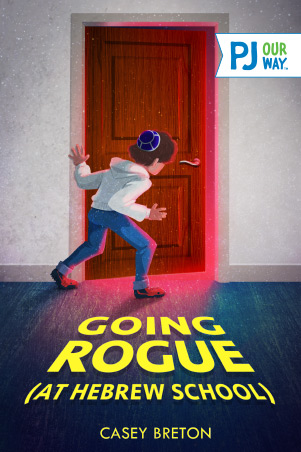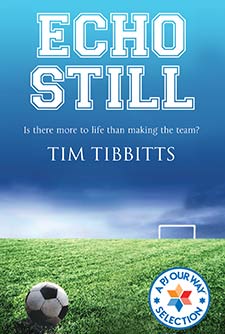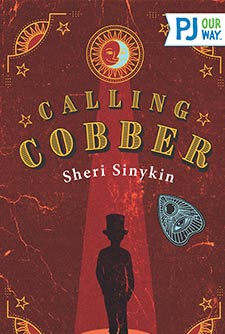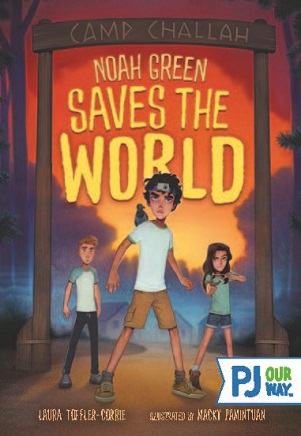Going Rogue (at Hebrew School)
A long time ago, in a galaxy far, far away, there was Avery Green. He loved Star Wars, science, and football. He did not love Hebrew school.
Enter Rabbi Bob.
Enter Rabbi Bob.
Average Rating
( hint: Login to leave a review! )
148 Reviews
Leave Review
What the Book Is About
Jewish Content & Values
Positive Role Models
Content Advisory
Talk It Over!
More for You
Ten-year-old Avery Green doesn’t understand why he has to go to Hebrew school. He would much rather play football, make science potions in his basement, or watch Star Wars movies. Things start to look up when Avery’s parents finally let him play football – and the new rabbi turns out to be a fellow Star Wars fan with a real light saber! But when Avery learns that he’s on the same team as weird Gideon and Damon the bully, he’s not sure how it’s going to work out. Even worse, Gideon insists on being nice to Damon no matter how mean Damon is to him. But when Gideon and Damon are both injured during the same game and Rabbi Bob encourages Avery to visit them, Avery’s perspective starts to change. This is a sweet, funny book about how sometimes it can be hard to be kind and why we should keep trying anyway.
- Avery attends Hebrew school in preparation for his bar mitzvah. There are several Hebrew school scenes that include Hebrew words and Jewish prayers, practices, and values.
- Several characters, including Avery’s bubbe (grandmother) and Rabbi Bob, use Yiddish words in their daily speech.
- Morah Neetza, Avery’s Hebrew School teacher, is Israeli and served in the Israeli army.
- There are references to several Jewish holidays, including Rosh Hashanah, Yom Kippur, Hanukkah, and Passover.
- Avery’s struggle to understand what it means to be Jewish and how to reconcile his commitment to science with Torah and belief in God are central themes in the story.
- Rabbi Bob teaches Avery about the Jewish value of bikkur cholim (visiting the sick), and the two of them visit Avery’s injured friends together.
- Several characters model the Jewish value of chesed through their ongoing kindness to members of their community – even community members such as Damon and his father, who bully both Avery and Gideon.
- Avery’s parents are committed to continuing the Jewish traditions they were raised in, and they work hard to be supportive of Avery’s interests.
- Rabbi Bob is funny, wise, and able to effectively engage with the children by connecting with their interests.
- Although he is a bit of an awkward child, Gideon is consistently thoughtful and kind to everyone in his life, even those who are mean or dismissive to him.
- Gideon’s Yapa (grandfather) is a former sailor who is deeply committed to his grandson and kind to Avery and Damon.
- Although Avery struggles to have empathy for Gideon and Damon and connect with Judaism, he matures significantly throughout the book.
While sharing the story of his Hebrew name, Avery briefly mentions the Holocaust and notes that his great-great-grandparents were killed by Nazis. In addition, Damon calls Gideon and Avery “dillweed” and “loser.” During a football game, Gideon sustains a mild concussion and Damon’s ankle is fractured; however, both children are fine, and their injuries are unlikely to be upsetting for most readers. Finally, Gideon’s grandfather, Yapa, is a former sailor and a bit of a character; although he never overtly swears, he does use some salty language.
Gideon shares that he is kind to Damon (who bullies him) because he’s fairly certain that no one else in Damon’s life is. Avery isn’t so sure how he feels about this. What do you think? Do you think we have a responsibility to be kind to people who are mean to us?
Bullying is about attempting to harm or intimidate someone who is less powerful or more vulnerable than you. In Jewish tradition, great value is placed on protecting and providing for community members who may be weaker and more vulnerable, such as widows or orphans. True strength doesn’t correlate with forcing others to bend to one’s will, but instead lies in controlling one’s own desires. In Ethics of our Fathers, Rabbi Ben Zoma asks and answers the question: “Who is strong? He who conquers his own evil inclination.”
What the Book Is About
Ten-year-old Avery Green doesn’t understand why he has to go to Hebrew school. He would much rather play football, make science potions in his basement, or watch Star Wars movies. Things start to look up when Avery’s parents finally let him play football – and the new rabbi turns out to be a fellow Star Wars fan with a real light saber! But when Avery learns that he’s on the same team as weird Gideon and Damon the bully, he’s not sure how it’s going to work out. Even worse, Gideon insists on being nice to Damon no matter how mean Damon is to him. But when Gideon and Damon are both injured during the same game and Rabbi Bob encourages Avery to visit them, Avery’s perspective starts to change. This is a sweet, funny book about how sometimes it can be hard to be kind and why we should keep trying anyway.
Jewish Content & Values
- Avery attends Hebrew school in preparation for his bar mitzvah. There are several Hebrew school scenes that include Hebrew words and Jewish prayers, practices, and values.
- Several characters, including Avery’s bubbe (grandmother) and Rabbi Bob, use Yiddish words in their daily speech.
- Morah Neetza, Avery’s Hebrew School teacher, is Israeli and served in the Israeli army.
- There are references to several Jewish holidays, including Rosh Hashanah, Yom Kippur, Hanukkah, and Passover.
- Avery’s struggle to understand what it means to be Jewish and how to reconcile his commitment to science with Torah and belief in God are central themes in the story.
- Rabbi Bob teaches Avery about the Jewish value of bikkur cholim (visiting the sick), and the two of them visit Avery’s injured friends together.
- Several characters model the Jewish value of chesed through their ongoing kindness to members of their community – even community members such as Damon and his father, who bully both Avery and Gideon.
Positive Role Models
- Avery’s parents are committed to continuing the Jewish traditions they were raised in, and they work hard to be supportive of Avery’s interests.
- Rabbi Bob is funny, wise, and able to effectively engage with the children by connecting with their interests.
- Although he is a bit of an awkward child, Gideon is consistently thoughtful and kind to everyone in his life, even those who are mean or dismissive to him.
- Gideon’s Yapa (grandfather) is a former sailor who is deeply committed to his grandson and kind to Avery and Damon.
- Although Avery struggles to have empathy for Gideon and Damon and connect with Judaism, he matures significantly throughout the book.
Content Advisory
While sharing the story of his Hebrew name, Avery briefly mentions the Holocaust and notes that his great-great-grandparents were killed by Nazis. In addition, Damon calls Gideon and Avery “dillweed” and “loser.” During a football game, Gideon sustains a mild concussion and Damon’s ankle is fractured; however, both children are fine, and their injuries are unlikely to be upsetting for most readers. Finally, Gideon’s grandfather, Yapa, is a former sailor and a bit of a character; although he never overtly swears, he does use some salty language.
Talk It Over!
Gideon shares that he is kind to Damon (who bullies him) because he’s fairly certain that no one else in Damon’s life is. Avery isn’t so sure how he feels about this. What do you think? Do you think we have a responsibility to be kind to people who are mean to us?
More for You
Bullying is about attempting to harm or intimidate someone who is less powerful or more vulnerable than you. In Jewish tradition, great value is placed on protecting and providing for community members who may be weaker and more vulnerable, such as widows or orphans. True strength doesn’t correlate with forcing others to bend to one’s will, but instead lies in controlling one’s own desires. In Ethics of our Fathers, Rabbi Ben Zoma asks and answers the question: “Who is strong? He who conquers his own evil inclination.”




